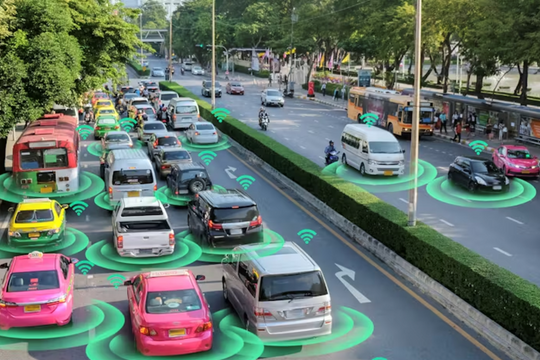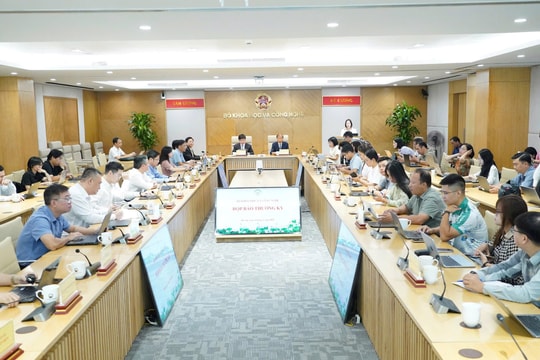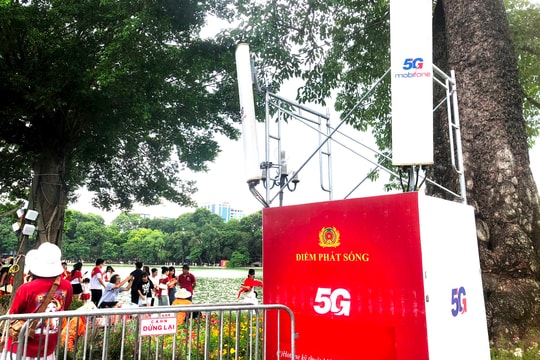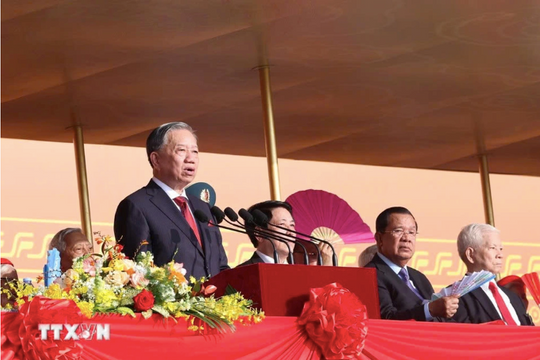
2020 is also the final year of the socio-economic development plan for the 2016-2020 period. In this year, we prepare and form the foundation for the 10-year development strategy from 2021 - 2030, and the 5-year plan from 2021 - 2025. At the same time, it is the year of holding the party congress at all levels towards the XIII National Congress of the Party.
In that context, with the overall goal of making 2020 "The year of national digital transformation" along with the action motto of "The Head set an example, Discipline, Focus, Breakthrough", the Information and Communication industry (ICT) continues to promote achievements, improve labor productivity, well implement strategic breakthroughs, make effective use of the fourth industrial revolution opportunities and especially develop synchronously and effectively in the fields of state management of the Ministry of Information and Communications.
SOME OUTSTANDING RESULTS IN THE FIELDS OF INFORMATION AND COMMUNICATION
According to the third quarter report of the Ministry of Information and Communications, the postal sector, after a period of social distancing, since the beginning of May, postal companies have prospered in service provision with growth results, especially postal companies specializing in delivering packages and parcels of goods for e-commerce. The address coding system associated with Vmap digital map has completed coding of more than 23.4 million addresses on the Vmap digital map platform. Regarding the development of the database of postal enterprises and the orientation of digital transformation for postal enterprises, currently, the Postal Department has completed step 1 of the development of the database of postal enterprises.
As of October 21, the number of licensed and confirmed enterprises was 521, an increase of 51 enterprises (or 11%) compared to the end of 2019. Revenue from postal delivery in the first 9 months of 2020 reached 23.3 trillion VND (up 14% over the same period in 2019). Volume of postal delivery in the first 9 months of 2020 reached 85.4 million letters (down 13% compared to the same period in 2019) and 590.6 million parcels (up 46% over the same period in 2019).

The telecommunications sector has the total cumulative revenue from telecommunications services by September 2020 of VND 97,875 billion, up 1.89% over the same period in 2019. Telecommunication revenue in September 2020 alone reached VND 10,844 billion, down 1.88% over the previous month (at 11.05 trillion), of which: mobile revenue in September 2020 reached 7,366 trillion, down 1.74% compared to August 2020 (7.5 trillion) and down 11.29% over the same period in 2019 (8.32 trillion).
Regarding IT application, the national data integration and sharing platform is built, gradually connecting, and sharing data among ministries, agencies, and localities. Prior to COVID-19, there were only about 40 connected ministries and provinces. Now, 85 ministries and provinces (61 provinces, 24 ministries) have been connected. Currently, 100% of ministries, agencies and localities have been connected, sending, and receiving electronic documents with the national document circulation bus. The rate of electronic document exchange nationwide is pretty high, reaching 90.81%.
By the end of November 2020, the proportion of ministries, agencies and localities having integrated data sharing platforms at ministerial and provincial level reached 97.64%
and is expected to reach 100% by the end of 2020. The percentage of state agencies that publicize the satisfaction level of people on using online services is now at 87.8%. This has exceeded the target of 50% set out by the Resolution No.17 of the Government in the period of 2019 - 2020 and now the Ministry strives to reach 100% by the end of 2020. In terms of the rate of level 4 public services, which is set out at 50%, currently it's only at 27.01% and expected to reach at least 30% by the end of 2020.
Regarding ICT industry, in the context of COVID-19 epidemic spreading rapidly around the world, the industry is also significantly affected by the 2nd wave of COVID-19, which has a negative impact on domestic production and export activities, hardware and electronics import and export still have significant growth. According to the report of the General Department of Customs, from the beginning of the year to October 15, 2020, the export value of hardware and electronics reached USD 73.6 billion, up 7.61% over the same period in 2019, of which the value of phone and components exports reached 39.4 billion USD, down 4.3% from the same period last year. However, the export value of electronics, computers and components reached 34.2 billion USD, up 25.7% over the same period last year, creating the growth of the field.
Electronic hardware is the category that accounts for the largest share of export revenue in the first 10 months of 2020 (including phones and components, computers, electronic products and components) and is expected to maintain leading position to the end of 2020, same as in previous years. The trade surplus is about USD 13.9 billion.
In the declining trend of many sectors of the economy, the ICT industry continues to maintain its growth even though it has not achieved the same growth rate in the previous years. It is estimated that by the end of October 2020, the total revenue of IT, electronics, and telecommunications industry (domestic, FDI) will reach over USD 100 billion, up 7.61% over the same period. To date, with good signs from exports compared to June 2020 (down 3.3%), the ICT industry is making a good recovery. If it continues to maintain the current growth momentum, it can achieve a revenue of over USD 120 billion by the end of 2020.
By the end of October 2020, the number of IT, electronics, and telecommunications enterprises (domestic and FDI) was estimated to reach 42,000, of which nearly 470 are FDI enterprises, accounting for 1.12%.
GET READY FOR THE DIGITAL ECONOMY AND DIGITAL SOCIETY
2020 is the year Vietnam declares its national digital transformation strategy. It is also a year of deep and comprehensive national digital transformation. Right after the national digital transformation project approved by the Prime Minister, the Ministry of Information and Communications has implemented it drastically.
According to Minister Nguyen Manh Hung, there are three things to do first and quickly, including: planning, awareness raising, and creating platforms for digital transformation.
During the year, the Ministry issued a framework, and based on this framework, ministries, agencies, and localities develop their own digital transformation projects. Up to now, more than 30 ministries, agencies and localities have issued digital transformation programs. In some places, the work is done very quickly, such as in Ho Chi Minh City, and Hue; in some provinces, the provincial party committee even issued dedicated resolutions.
In terms of awareness raising, the ministry has directed media agencies to set up a special topic on digital transformation. The ministry also publishes a set of manuals on digital transformation, both in paper-based and electronic formats, in the form of simple and easy-to-understand questions.
The ministry has piloted digital transformation in 10 communes, with special focus on mountainous communes. Thanks to the introduction of digital technology to promote products on the trading floor, in a commune in Bac Kan province, the income of people in the cooperative has increased from 1 to 1.5 million VND to 3.5 million VND per month.
Besides institutions, technology has been identified as the driving force for the development of digital government, digital economy, and digital society, making Vietnam become a digital nation and a smart country.
Along with emphasizing the most important role of awareness which needs to be one step ahead, the Ministry of Information and Communications identified the development and launch of "Make in Vietnam" digital platforms a breakthrough solution to accelerate the digital transformation process. To find technological solutions to address corporate and social problems, and to promote digital transformation in various fields, from mid-April 2020 up to now, the Ministry of Information and Communications has continuously introduced more than 30 "Make in Vietnam" technology platforms from Vietnamese vendors.
Speaking at the recent 2020 ITU Digital World Exhibition and Conference, Minister of Information and Communications Nguyen Manh Hung emphasized: Vietnam considers digital platforms as a way to accelerate the digital transformation of the country. Cybersecurity is considered the main factor to create digital trust. Institutional reform is seen as the decisive factor for digital transformation. The Minister also shared that a digital infrastructure with "Make in Vietnam" digital products and platforms is ready for digital economy and digital society, for a digital Vietnam. Vietnamese technologies not only solve Vietnamese problems but also contributes to solving global problems.
In addition, the ministry will also focus on supporting the development of digital technology enterprises across the country, aiming to have one digital technology enterprise per 1,000 people to bring IT into all aspects of the social life. The ministry also supports and promotes 100% of localities to promulgate digital technology enterprise development plans. The development of digital technology enterprises will have to be associated with national digital transformation.
At the same time, the ministry promotes telecommunications businesses, smartphone manufacturers and digital technology companies in general to cooperate, in order to ensure that each citizen has 1 smartphone, each household has 1 fiber connection, creating the premise for digital transformation, towards digital economy, digital society and digital government.






















